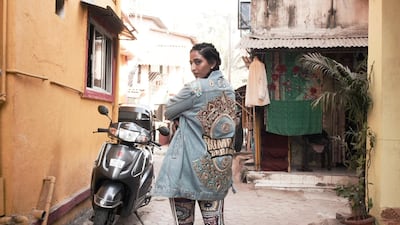It is the question that haunts most artists: what is it that I am trying to say?
For Raja Kumari, it becomes even more pertinent because the singer and songwriter has spent most of her young career acting as a vessel for other people's voices. "When you are a songwriter, you are not thinking about yourself first," she says. "I would get into the studio and I would be thinking about what Demi Lovato or Gwen Stefani are really trying to say with this song. So when it comes to your own work, it is a different process."
Not that Kumari, real name Svetha Rao, is complaining. The 31-year-old Indian-American has established herself as an in-demand songwriter in the cut-throat North American music industry, by co-penning a string of hits that include Centuries by Fall Out Boy, half of last year's Gwen Stefani heartbreak album This Is What the Truth Feels Like, and Like Mariah from Fifth Harmony's chart-topping 2015 debut album Reflection. Kumari's voice can also be heard on the hook of Iggy Azalea's well-received 2013 single Change Your Life.
But after more than five years of honing her craft, Kumari is now ready to branch out on her own. Having penned a deal with Sony Music India, the stage was set for the release of new material, and Kumari decided that the best answer to that aforementioned question was to write about home.
So City Slums is a euphoric hip-hop anthem celebrating Mumbai and paying tribute to its burgeoning young artists. "That was very important to me, in that there are a lot misconceptions surrounding India and Mumbai," says Kumari, who both sings and raps on the track. "I wanted to show that this was not the case, and create a song and do a video that shows there is a colourful youth culture there [who are] expressing themselves and telling their stories through hip-hop."
To push that point home, Kumari collaborated with Mumbai rapper Divine, who is widely acknowledged as one of the leading lights of the Indian hip-hop scene. Another hat tip to the metropolis is delivered via the song's polished accompanying video: the duo drive through various landscapes in the city, from the urban centres to the slums, to reveal a proud, resilient population.
Given her well-established career in the United States, it may be confusing to some that Kumari would choose to kick-start her career from another part of the world, particularly one where her genre is yet to gain a strong foothold. Born and raised in Los Angeles, Kumari explains that her decision to launch her solo career in India came through an impulse to be grounded.
“I always had this idea that I wanted to preserve my Indian culture and I never wanted to lose that,” she explains. “I realised that I wasn’t practising what I was preaching. I only visited India, but I didn’t understand the details of the place, and it was hypocritical of me to be thinking that I wanted to represent India on this international stage without that understanding. So I realised I had go there and spend a lot of time, and I was inspired about being there.”
Kumari is also giving back: as well as regularly travelling between Los Angeles and India, she has begun hosting songwriting workshops in Mumbai and passing on the knowledge she has gained over the years.
Ironically, Kumari's first foray into songwriting began more than five years ago as a way to bolster her own career. "It was just a way for me to spend more time in the studio," she admits. "One day, a producer asked me to stay back and help write some songs for these 12-year-olds who were coming in to record, and I remember it being so easy to do – I wrote these songs in about 20 minutes, and I realised that this was a way that I could spend more time in the studio, as opposed to waiting months for a session."
The experience led her to being invited to more songwriting sessions, and eventually camps in Sweden, Denmark and Jamaica. She was also introduced to heavy-hitters such as Justin Tranter and J R Rotem, with whom she wrote Centuries and the bulk of her Stefani tracks.
While songwriters are often the unsung heroes in pop music, Kumari says that no matter how good a tune is, it can only reach its true potential when it is delivered through a talented artist. "That is something that I study when I am in the studio. I mean, Centuries wouldn't be where it is if it wasn't for Fall Out Boy being at the top of their game," she says. "As songwriters, we just help the artist to explore what they are trying to say. When we were working with Gwen Stefani, she was going through such an emotional time at that period, and she would come to the studio with notes from her journal and we would work from that. I look at what we do sometimes as being a support system for the artist."
City Slums by Raja Kumari is out now
________________________
Read more:
Habibi Funk: rare tunes from Arabia
The poetic licence of Arab indie scene leader Tania Saleh
________________________


